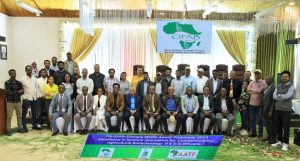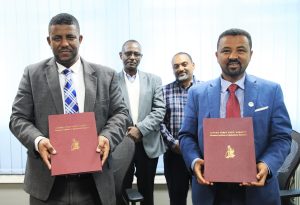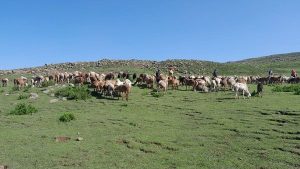**********************************************************
November 4.2024; Addis Ababa
The third training cycle, titled “Harnessing Artificial Intelligence Applications for Agricultural Research in Ethiopia: AI for Resilient Food Systems,” began at EIAR’s Hiruy Hall, with the participation of all stakeholders. Keynote speeches delivered by the leaders of event organizers, including EIAR, EAII, and MiNT, emphasized how to leverage AI tools to accelerate agricultural research for development. They highlighted the global significance of AI-based solutions and their economic impact.
Professor Nigussie Dechassa, Director General of EIAR, emphasized in his welcoming remarks that artificial intelligence (AI) spans multiple disciplines and plays a crucial role in various sectors, including agriculture. He pointed out that in order to achieve the country’s goal of self-sustaining economic growth, we must consider innovative approaches beyond our current efforts. Consequently, AI should be regarded as an integral component of research programs and projects that we need to actively pursue.
In his inaugural statement, the honorable Dr. Baysa Bedada, State Minister of the Ministry of Innovation and Technology, emphasized the importance of embarking on critical initiatives that align with the mission of our Prime Minister, His Excellency Dr. Abiy Ahmed, to establish a digital Ethiopia. This includes various activities, such as training five million coders and numerous other achievements in the realm of digitalization. He also highlighted that artificial intelligence has emerged as a transformative tool in agriculture, which can significantly improve our future food security.
The keynote speech delivered by the honorable Dr. Diriba Geleti, Deputy Director General of the Ethiopian Institute of Agricultural Research (EIAR), emphasized the crucial role of artificial intelligence (AI) in transforming Ethiopian food systems. He highlighted how AI can effectively tackle challenges in agriculture, including weeding, soil moisture detection, spraying, and crop yield monitoring. Dr. Diriba also noted that AI contributes to enhancing agricultural practices in Ethiopia.
In his keynote address, Honorable Dr. Taye Girma, the Deputy Director General of the Artificial Intelligence Institute and Associate Professor at AASTU, emphasized the growing optimism surrounding the agricultural revolution in the context of the fourth industrial revolution and the emergence of new technologies. He pointed out that technology-driven agriculture is leading the way in integrating artificial intelligence, supported by advancements in drone technology, sensors, and IoT devices. Furthermore, he highlighted that the use of integrated technologies, such as precision farming, enhances both productivity and sustainability. The application of AI focuses on data and its quality to effectively translate into real-world outcomes.
Dr. Habtamu Abera, CEO of National Research and Development at the Ministry of Innovation and Technology, discussed various aspects of research management in the age of AI and its contribution to our economy.
The program will span four days and will feature panel talks, demonstrations, presentations, training on use cases, AI tools, and question-and-answer group discussions presented by prominent lectures from local organizations and abroad (UK, France, China-CAAS, and South Africa) before it is concluded on Thursday, November 7, 2024.







